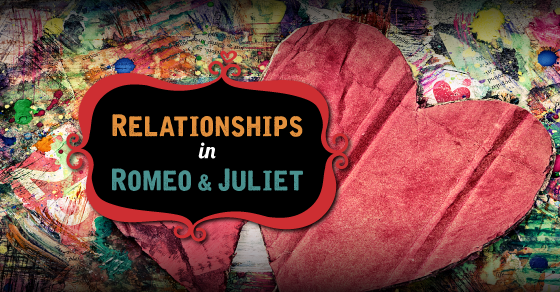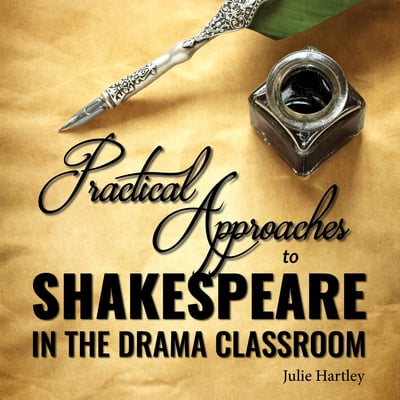Relationships in Romeo and Juliet
Go, counsellor: Thou and my bosom henceforth shall be twain.
Juliet, Act III, scene v
There are more relationships in Romeo and Juliet than just the one between Romeo and Juliet. We have relationships between parents and teens, between friends, and between enemies.
Read the article and try the exercises with your students. You can download a printable PDF of this article and all the exercises below.
Adults and Teens
Away from light steals home my heavy son, and private in his chamber pens himself, Shuts up his windows, locks fair daylight out, and makes himself an artificial night.
Montague, Act I, scene i
Romeo and Juliet not only have a relationship with each other, they also have relationships to the adults in their lives. Though the play is several hundred years old, these relationships are very similar to those between adults and teens today. Youth vs age is a running thread, old and new. Juliet observes that if the Nurse were young she would be “swift in motion as a ball,” but as it is she’s old and slow. Change the word choice and it could be taken from a conversation heard in any high school hallway.
First are the parent/teen relationships. Romeo’s parents rarely talk to him. They seem as confused by his behaviour as many parents today are confused by their sullen teens who lock themselves in their room.
Juliet’s parents demand that she obey them in a “my house, my rules” kind of way. Capulet initially seems protective of his daughter, but later his true nature comes out.
It’s interesting how the parents react to their children’s deaths – Lady Montague kills herself at Romeo’s banishment, and the Capulets show intense sorrow at finding Juliet “dead.” But if they truly feel such grief when their children are gone, why aren’t they more connected to them before this moment?
One aspect of the parent/teen relationship (perhaps not as prevalent today) is the surrogate parent. Juliet was not raised by her mother but by the Nurse. to the point that the Nurse even breastfed Juliet when she was a baby. Juliet’s mother is so detached from her daughter that when she has the big news at the beginning of the play about Paris, she asks the Nurse to stay and witness the conversation. The Nurse is Juliet’s only confidante and friend.
It’s clear that Romeo and the Friar have a bond, and this bond is stronger than with any of his friends. When Romeo is in trouble, he doesn’t turn to his parents. He runs to the Friar.
Both sets of parents, real and surrogate, fail to be good parents. Lord and Lady Capulet would see Juliet disowned before disobedient. Romeo’s parents are absent in his journey. Both the Friar and the Nurse put themselves ahead of their charges – the Nurse sides with her employers over Juliet and the Friar abandons Juliet in the tomb so he won’t be caught. What message does this convey about whether or not the teens should trust adults?
Exercises
- Journal Prompt: Are the adults in your life trustworthy? Are they looking out for your best interests? Compare your relationships with adults to those of Romeo and Juliet.
- Journal Prompt: What do you share with the adults in your life? What do you keep secret? Is there an adult in your life that you consider a friend? What do you think it means to be an adult?
- Journal Prompt: Sometimes adults don’t want to know the truth, they just want a teen to “present” as a good person. Have you ever had to lie because an adult didn’t want to know the truth?
- In groups, discuss the idea of the good parent. Should we cut the parents in Romeo and Juliet some slack because they were only behaving as parents would in that time period? Are we thinking too much in 21st Century terms? Or should a good parent always put their children first?
- Compare and contrast Juliet’s relationship with the Nurse with her relationship with her mother. Why does Lady Capulet not want to be alone with Juliet in Act I, scene iii? Why does the Nurse decide to tell Juliet to forget Romeo?
- Reflect on Romeo’s relationship with his mother. We learn at the end of the play that she killed herself from grief at his banishment, but we have no text between them.
- Reflect on Youth vs Age in the play. Examine the first conversation between Romeo and the Friar (Act II, scene iii) and Juliet’s conversation with the Nurse when she’s waiting to hear news from Romeo. (Act II, scene v)
- Montague says that he has tried talking to Romeo to find out what’s wrong with him with no success. In groups, discuss what it’s like when parents try to get information from you.
- Using Act I, scene i as a guide, write a modern scene about a parent’s concern for their teen’s behaviour. Have it take place outside the locked door of their son’s bedroom. What do they do to try and get the son to come out? Are they clueless in how to talk to a teenager?
- Using Act III, scene iv as a guide, write a modern scene which explores the notion of “my house, my rules.” How would a modern set of parents embody this, compared to Lord and Lady Capulet?
- In groups, examine Act III, scene iv and identify the words and images Capulet uses on Juliet. Mistress minion, for example. Would you like to have your father say those words to you? Choose a couple of terms and create tableaux to visualize them. What impact do the words have visually?
- In Act IV scene iii, Juliet lies to her parents, saying that she’s realized the error of her ways and will marry Paris. Write Juliet’s inner monologue. What does she really want to say to her father?
- In groups, read and examine Act IV, scene v. After Capulet has threatened and screamed at his daughter, after Lady Capulet has told Juliet “go ahead and kill yourself,” they both seem to exhibit genuine despair at her death. Why is that? What are they going through in this scene? Is it genuine?
Friends & Enemies
Prodigious birth of love it is to me, That I must love a loathed enemy.
Juliet, Act I, scene v
Romeo and Juliet is based on the nature of friends and enemies. [aside: The concept of “enemy” is so strong in the play but the word itself is only used six times. The word “friend” and its forms are used twenty times.] These powerful states are vital to the story – The prologue mentions the feuding families before it mentions the lovers. Everything happens because the two families are foes. Romeo is both friend and enemy to Juliet. When Juliet says goodbye to Romeo in Act III, scene v, she calls him both “husband” and “friend.” The word is used to symbolize someone you care for, even when it’s used ironically: The Nurse wails that Tybalt was “the best friend she ever had” after his death, even though one wonders if they ever had a conversation.
The word “friend” takes on a chilling connotation in Act V: Romeo tells the apothecary, who is afraid of selling him the poison, that the world is not your friend. Juliet searches for one “friendly” drop of that poison to end her life and join Romeo in death.
In act III, scene i, Romeo declares, “This gentleman, the prince’s near ally, My very friend, hath got his mortal hurt In my behalf.” In my research for this newsletter, I found many remarks that Romeo and Mercutio are best friends. I’m not convinced. Romeo may think so. But he is often so caught up in his own world he doesn’t see the reality of life around him. When Mercutio searches for Romeo in Act II, he mocks Romeo’s state of mind, and mocks the way Romeo speaks of love. “Appear thou in the likeness of a sigh: Speak but one rhyme, and I am satisfied.” Certainly it’s humourous, but there’s a bite to it. And there is a lot of bite when Mercutio curses the two families at his death. There’s a reason Mercutio asks Benvolio (not Romeo) to take him away.
Exercises
- Journal Prompt: Reflect on the word “friend.” What does it mean to you? Do you consider romantic partners to be friends?
- Journal Prompt: Reflect on the word “enemy.” Do you have an enemy? What happened to make that person your enemy? Do you feel the reactions of characters in the play toward their enemies is realistic or exaggerated?
- Write a song in which you use the word friend to mean loved one. What images will you use?
- Compare and contrast Mercutio and Tybalt. How are they similar? How are they different?
- Create a collage of textures, colours and images that represents Mercutio on one side and Tybalt on the other. What are the similarities? What are the differences?
- Respond to the statement, “Romeo and Mercutio are not best friends.” Do you agree or disagree? Support your answer with examples from the play.
- Write a modern, inner monologue for Mercutio as he lies dying, where he expresses what he thinks of his friendship with Romeo.
- When Benvolio describes the fight, he says that Romeo said, “Hold, friends! Friends, part!” This is not what Romeo really said (“Hold, Tybalt! Good Mercutio!”) What does this tell you about Benvolio’s character?
- Write a scene in which Tybalt and Mercutio meet up in the afterlife. What would their conversation be? How would they change? How would they stay the same? What would they think about their families and the outcome of the play?
Practical Approaches to Shakespeare in the Drama Classroom
by Julie Hartley
Shakespeare is one of the greatest resources a drama teacher can have. But teaching it can be a challenge. Practical Approaches to Shakespeare in the Drama Classroom helps drama teachers break down the Bard to make his themes, language and characters accessible to all.
Script Bundle - Shakespeare plays
A selection of 10 Shakespeare perusal scripts. Whether it's a cutting that uses the original text, a monologue or scene book, or a parody that spoofs the story, these plays offer a great window into Shakespeare's world.





